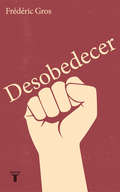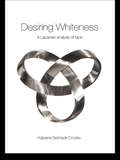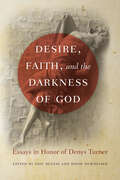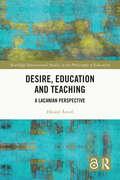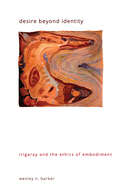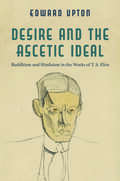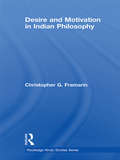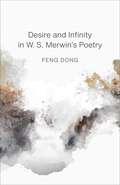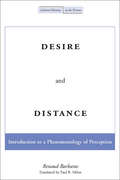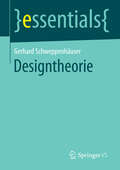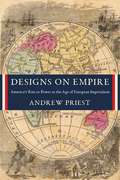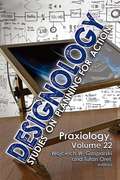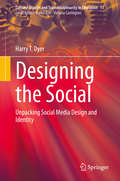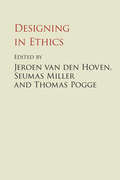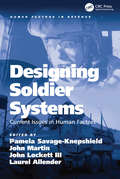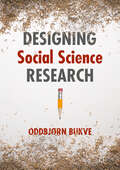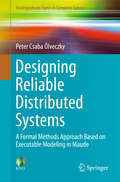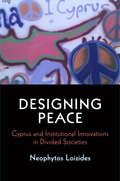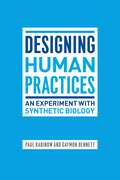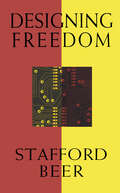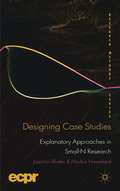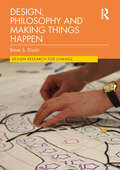- Table View
- List View
Desobedecer
by Frédéric GrosDesobedecer es obedecerse a sí mismo. Un libro contra el conformismo generalizado y la inercia del mundo actual, por el autor de Andar. Una filosofía. «¿Por qué desobedecer? Basta con tener ojos en la cara. La desobediencia está tan justificada, es tan normal, que lo que choca es la falta de reacción, la pasividad.» Desobedecer debería ser una necesidad urgente y compartida. En esta estimulante invitación a ser responsables, valientes y por lo tanto desobedientes, Frédéric Gros desmitifica todas nuestras razones para acatar las normas, analiza nuestra capacidad de aceptar lo inaceptable y defiende la transgresión como única manera, hoy, de reafirmar nuestra humanidad. La historia nos ha mostrado con fuerza la figura de los monstruos de la obediencia, y nuestra ancestral tendencia a la sumisión lleva siglos intrigando a los filósofos. En conversación con autores como Sócrates, Montaigne, Arendt, Thoreau o Kant, que nos convencen de hasta qué punto transgredir puede ser razonable, Gros nos acompaña en un ameno recorrido por la historia del conformismo, repleto de anécdotas y ejemplos, y nos permite así descubrir, inventar y provocar nuevas y originales formas de desobediencia. Este libro nos recuerda que la filosofía, en el fondo, es precisamente el pensamiento en rebelión, y nos ofrece una verdadera ética de la desobediencia frente al desastre colectivo de nuestro mundo actual, que se alimenta de conformismo y cobardía. Críticas:«Una reflexión personal de admirable claridad e inteligencia. Gros rastrea con placer esa parcela de responsabilidad que corresponde a cada uno de nosotros, por nuestros silencios, por nuestras rutinas, por nuestras coartadas, en el sistema general de obediencia. He aquí un ensayo que le gustaría a Sócrates.»Roger-Pol Droit, Le Monde «El filósofo Frédéric Gros analiza los resortes de nuestra pasividad. El ciudadano se somete por miedo, conformismo o placer. Pero también para huir de su responsabilidad. La desobediencia no está reñida con la democracia.»Libération «Magistral. Frédéric Gros muestra la desobediencia como un horizonte político al mismo tiempo eterno y extremadamente contemporáneo, pues resuena en las voces insurrectas de hoy.»Les Inrockuptibles «Un tema palpitante. Merece esa pequeña toma de distancia que es la lectura de un libro.»L'Express «Un ensayo profundo y saludable.»L'Humanité «¡Inspirador!»Elle
Desiring Whiteness: A Lacanian Analysis of Race (Opening Out: Feminism for Today)
by Kalpana Seshadri-CrooksDesiring Whiteness provides a compelling new interpretation of how we understand race. Race is often seen to be a social construction. Nevertheless, we continue to deploy race thinking in our everyday life as a way of telling people apart visually. How do subjects become raced? Is it common sense to read bodies as racially marked? Employing Lacan's theories of the subject and sexual difference, Seshadri-Crooks explores how the discourse of race parallels that of sexual difference in making racial identity a fundamental component of our thinking. Through close readings of literary and film texts, Seshardi-Crooks also investigates whether race is a system of difference equally determined by Whiteness. She argues that it is in relation to Whiteness that systems of racial classification are organized, endowing it with a power to shape human difference.
Desire, Faith, and the Darkness of God: Essays in Honor of Denys Turner
by Eric Bugyis and David NewheiserIn the face of religious and cultural diversity, some doubt whether Christian faith remains possible today. Critics claim that religion is irrational and violent, and the loudest defenders of Christianity are equally strident. In response, Desire, Faith, and the Darkness of God: Essays in Honor of Denys Turner explores the uncertainty essential to Christian commitment; it suggests that faith is moved by a desire for that which cannot be known.This approach is inspired by the tradition of Christian apophatic theology, which argues that language cannot capture divine transcendence. From this perspective, contemporary debates over God’s existence represent a dead end: if God is not simply another object in the world, then faith begins not in abstract certainty but in a love that exceeds the limits of knowledge.The essays engage classic Christian thought alongside literary and philosophical sources ranging from Pseudo-Dionysius and Dante to Karl Marx and Jacques Derrida. Building on the work of Denys Turner, they indicate that the boundary between atheism and Christian thought is productively blurry. Instead of settling the stale dispute over whether religion is rationally justified, their work suggests instead that Christian life is an ethical and political practice impassioned by a God who transcends understanding.
Desire, Education and Teaching: A Lacanian Perspective (Routledge International Studies in the Philosophy of Education)
by Håvard ÅsvollExploring the implications of a novel theory of educational desire on the prevailing modes of educational research and theory, this book contextualises the realm of education studies through the challenging philosophies and theories of Lacan, thereby providing a genuinely alternative approach to the study of education.Structured into three main parts, the book provides a discussion of Lacanian ideas within educational research by setting out a description and analysis of how a theory of desire may work in educational settings and practice. Using vignettes and examples to drive the discussion, chapters explore the pivotal aspects of desire, which could be imaginary, symbolic, or real, elucidated by a mapping of discourses and exploring the reluctance of educational studies to engage with themes related to desire and psychoanalysis. Ultimately, the book argues for the need to disrupt the theoretical and practical logics and models that limit teacher practice, such as accountability, visible learning, competencies, pedagogical knowledge, and professional development, and how these can be better understood from a Lacanian perspective.This book will be of use to scholars, researchers, and academics in the fields of the philosophy of education, the theory of education, and teachers and teacher education more broadly. Those specifically interested in Lacanian psychoanalysis and a Lacanian view on how the concept of desire may influence educational research and practice will also find the book of use.
Desire beyond Identity: Irigaray and the Ethics of Embodiment (SUNY series in Gender Theory)
by Wesley N. BarkerCritically adapts the notion of desire in Luce Irigaray's philosophy to rethink the role of embodiment in sociopolitical and philosophical discourses today.Arguing for a radical return to desire in Luce Irigaray's thought, this book decisively intervenes in impasses around questions of identity that continue to confound contemporary discourse and politics. By prioritizing the disruptive potential of desire rather than sexual difference, Wesley N. Barker extends Irigaray's relational theory of becoming into new territory, opening generative, often surprising pathways for conversation with philosophies of race, queer theory, political theology, decolonial theory, and posthuman thought. As a source for reimagining materiality, desire is pulled free of a phallocentric, white, colonial framework and mobilized toward a philosophy of living capable of addressing the twenty-first century's multifaceted crises of identity, representation, and embodiment.
Desire and the Ascetic Ideal: Buddhism and Hinduism in the Works of T. S. Eliot (Studies in Religion and Culture)
by Edward UptonThe Hindu words "Shantih shantih shantih" provide the closing of The Waste Land, perhaps the most famous poem of the twentieth century. This is just one example among many of T. S. Eliot’s immersion in Sanskrit and Indian philosophy and of how this fascination strongly influenced his work.Centering on Eliot’s study of sources from ancient India, this new book offers a rereading of the poet’s work, analyzing his unpublished graduate school notebooks on Indian philosophy and exploring Eliot’s connection with Buddhist thought. Eliot was crucially influenced by his early engagement with Indian texts, and when analyzed through this lens, his poems reveal a criticism of the attachments of human desire and the suggestion that asceticism might hold out the possibility that desire can be cultivated toward a metaphysical absolute. Full of such insights, Upton’s book represents an important intervention in modernist studies.
Desire and Motivation in Indian Philosophy (Routledge Hindu Studies Series)
by Christopher G. FramarinDesireless action is typically cited as a criterion of the liberated person in classical Indian texts. Contemporary authors argue with near unanimity that since all action is motivated by desire, desireless action is a contradiction. They conclude that desireless action is action performed without certain desires; other desires are permissible. In this book, the author surveys the contemporary literature on desireless action and argues that the arguments for the standard interpretation are unconvincing. He translates, interprets, and evaluates passages from a number of seminal classical Sanskrit texts, and argues that the doctrine of desireless action should indeed be taken literally, as the advice to act without any desire at all. The author argues that the theories of motivation advanced in these texts are not only consistent, but plausible. This book is the first in-depth analysis of the doctrine of desireless action in Indian philosophy. It serves as a reference to both contemporary and classical literature on the topic, and will be of interest to scholars of Indian philosophy, religion, the Bhagavadgita and Hinduism.
Desire and Infinity in W. S. Merwin's Poetry
by Dong FengIn the first monograph on W. S. Merwin to appear since his death in 2019, Feng Dong focuses on the dialectical movement of desire and infinity that ensouls the poet’s entire oeuvre. His analysis foregrounds what Merwin calls “the other side of despair,” the opposite of humans’ articulated personal and social agonies. Feng finds these presences in Merwin’s evocations of what lingers on the edge of constantly updated socio-symbolic frameworks: surreal encounters, spiritual ecstasies, and abyssal freedoms. By examining Merwin’s lifelong engagement with psychic fantasies, anonymous holiness, entities both natural and supernatural, and ghostly ancestors, Feng uncovers a precarious relation with the unarticulated, unrealized side of existence. Drawing on theories from Lacan, Žižek, Levinas, and Heidegger, Desire and Infinity in W. S. Merwin’s Poetry reads a metaphysical possibility into the poet’s work at the intersection between contemporary poetics, philosophy, and psychoanalysis.
Desire and Human Flourishing: Perspectives from Positive Psychology, Moral Education and Virtue Ethics (Positive Education)
by Magdalena BoschThis book discusses the concept of desire as a positive factor in human growth and flourishing. All human decision-making is preceded by some kind of desire, and we act upon desires by either rejecting or following them. It argues that our views on and expressions of desire in various facets of life and through time have differed according to how human beings are taught to desire. Therefore, the concept has tremendous potential to affect human beings positively and to enable personal growth. Though excellent research has been done on the concepts of flourishing, character education and positive psychology, no other work has linked the concept of desire to all of these topics. Featuring key references, explanations of central concepts, and significant practical applications of desire to various fields of human thought and action, the book will be of interest to students and researchers in the fields of positive psychology, positive education, moral philosophy, and virtue ethics.
Desire and Distance: Introduction to a Phenomenology of Perception
by Paul Milan Renaud BarbarasDesire and Distance constitutes an important new departure in contemporary phenomenological thought, a rethinking and critique of basic philosophical positions concerning the concept of perception presented by Husserl and Merleau-Ponty, though it departs in significant and original ways from their work. Barbaras's overall goal is to develop a philosophy of what "life" is--one that would do justice to the question of embodiment and its role in perception and the formation of the human subject. Barbaras posits that desire and distance inform the concept of "life." Levinas identified a similar structure in Descartes's notion of the infinite. For Barbaras, desire and distance are anchored not in meaning, but in a rethinking of the philosophy of biology and, in consequence, cosmology. Barbaras elaborates and extends the formal structure of desire and distance by drawing on motifs as yet unexplored in the French phenomenological tradition, especially the notions of "life" and the "life-world," which are prominent in the later Husserl but also appear in non-phenomenological thinkers such as Bergson. Barbaras then filters these notions (especially "life") through Merleau-Ponty.
Designtheorie (essentials)
by Gerhard SchweppenhäuserDas essential bietet eine ideengeschichtliche Erkundung moderner Konzepte von Design. Es schlägt Positions- und Kursbestimmungen für ein zukunftsfähiges Design vor und diskutiert Aspekte des engen und des erweiterten Designbegriffs. Die Ambivalenz von Design zwischen Entwurf für den bestehenden Bedarf und Entwurf eines noch nicht Seienden wird philosophisch fruchtbar gemacht.
Designs on Empire: America's Rise to Power in the Age of European Imperialism
by Andrew PriestIn the eyes of both contemporaries and historians, the United States became an empire in 1898. By taking possession of Cuba and the Philippines, the nation seemed to have reached a watershed moment in its rise to power—spurring arguments over whether it should be a colonial power at all. However, the questions that emerged in the wake of 1898 built on long-standing and far-reaching debates over America’s place in the world.Andrew Priest offers a new understanding of the roots of American empire that foregrounds the longer history of perceptions of European powers. He traces the development of American thinking about European imperialism in the years after the Civil War, before the United States embarked on its own overseas colonial projects. Designs on Empire examines responses to Napoleon III’s intervention in Mexico, Spain and the Ten Years’ War in Cuba, Britain’s occupation of Egypt, and the carving up of Africa at the Berlin Conference. Priest shows how observing and interacting with other empires shaped American understandings of the international environment and their own burgeoning power. He highlights ambivalence among American elites regarding empire as well as the prevalence of notions of racial hierarchy. While many deplored the way powerful nations dominated others, others saw imperial projects as the advance of civilization, and even critics often felt a closer affinity with European imperialists than colonized peoples.A wide-ranging book that blends intellectual, political, and diplomatic history, Designs on Empire sheds new light on the foundations of American power.
Designology: Studies on Planning for Action (Praxiology)
by Wojciech W. Gasparski Tufan OrelThe more complex a human action is, the greater the need to formulate a plan of action, devise a method of implementation, and evaluate its execution. Such preparation is called design or planning, and can be defined as a conceptual preparation for action. Design and planning by themselves are so complex and important that they need informed preparation, which calls for systematic designological studies.This volume brings together original contributions of researchers and practitioners in design theory, design research, and design studies. Its main purpose is to highlight the possibilities of the discipline of designology. Doing and thinking, or thinking and doing, whatever the order, are intertwined. That is why praxiology, the science of action, defines design as a conceptual preparation of action.Included here are contributions from Jack Brzezinski, Eduardo Corte-Real, Nigel Cross, Michel Faucheux, Joelle Forest, Wojciech W. Gasparski, Ioannes B. Kapelouzos, Thorbjoern Mann, Tom Maver, Tarkko Oksala, Tufan Orel, Sevil Saryldz, and Ladislav Tondl. Designology is the latest volume in Transaction's highly regarded Praxiology series.
Designing the Social: Unpacking Social Media Design and Identity (Cultural Studies and Transdisciplinarity in Education #11)
by Harry T. DyerThis book uses data collected from in-depth interviews with young people over the course of a year to explore the complex role of social media in their lives, and the part it plays in shaping how they understand and present their identity to a broad public on a wide array of platforms. Using this data, the book proposes and develops a new theoretical framework for understanding identity performances. Comic Theory, detailed in this book, centres on a consideration of the role of social media design in shaping identity, and explores the ways in which socio-culturally grounded users engage in acts of compromise, novelty, and negotiation with social media designs and digital technologies to produce unique identity performances.Positioned within the field of educational research, this book overtly challenges assumptions and myths about the internet as a neutral source of knowledge, instead exploring the way in which designs and technologies shape who we interact with and how we understand what it is to be social. Moving beyond the over-used ‘digital natives’ paradigm, this book makes a clear case that educators and education researchers need to move beyond a focus on coding and digital skills alone, highlighting the pressing need to take explicit account of the overlaps between digital technology, culture, and education.
Designing in Ethics
by Seumas Miller Thomas Pogge Jeroen Van Den HovenMany of our interactions in the twenty-first century - both good and bad - take place by means of institutions, technology, and artefacts. We inhabit a world of implements, instruments, devices, systems, gadgets, and infrastructures. Technology is not only something that we make, but is also something that in many ways makes us. The discipline of ethics must take this constitutive feature of institutions and technology into account; thus, ethics must in turn be embedded in our institutions and technology. The contributors to this book argue that the methodology of 'designing in ethics' - addressing and resolving the issues raised by technology through the use of appropriate technological design - is the way to achieve this integration. They apply their original methodology to a wide range of institutions and technologies, using case studies from the fields of healthcare, media and security. Their volume will be important for philosophical practitioners and theorists alike.
Designing Soldier Systems: Current Issues in Human Factors (Human Factors in Defence)
by John Martin Pamela Savage-Knepshield John Lockett III Laurel AllenderThis book focuses on contemporary human factors issues within the design of soldier systems and describes how they are currently being investigated and addressed by the U.S. Army to enhance soldier performance and effectiveness. Designing Soldier Systems approaches human factors issues from three main perspectives. In the first section, Chapters 1-5 focus on complexity introduced by technology, its impact on human performance, and how issues are being addressed to reduce cognitive workload. In the second section, Chapters 6-10 concentrate on obstacles imposed by operational and environmental conditions on the battlefield and how they are being mitigated through the use of technology. The third section, Chapters 11-21, is dedicated to system design and evaluation including the tools, techniques and technologies used by researchers who design soldier systems to overcome human physical and cognitive performance limitations as well as the obstacles imposed by environmental and operations conditions that are encountered by soldiers. The book will appeal to an international multidisciplinary audience interested in the design and development of systems for military use, including defense contractors, program management offices, human factors engineers, human system integrators, system engineers, and computer scientists. Relevant programs of study include those in human factors, cognitive science, neuroscience, neuroergonomics, psychology, training and education, and engineering.
Designing Social Science Research
by Oddbjørn BukveThis book presents different research designs, their respective purposes and merits as well as their underlying assumptions. Research designs are characterised by a certain combination of knowledge aims and strategies for data production. An adequate design is the key to carrying out a successful research project. Nevertheless, the literature on design is scarce, compared to the literature on methods. This book clarifies the basic distinction between variable-oriented designs and case designs, and proceeds to integrated, comparative and intervention-oriented designs. A step-by-step guide to the design process and the choices to make is also included. The book's clear style makes it an excellent guide for master students and PhD students doing their first research exercises, while it is also useful for more experienced researchers who want to broaden their design repertoire and keep up to recent innovations in the field of research design.
Designing Reliable Distributed Systems
by Peter Csaba ÖlveczkyThis classroom-tested textbook provides an accessible introduction to the design, formal modeling, and analysis of distributed computer systems. The book uses Maude, a rewriting logic-based language and simulation and model checking tool, which offers a simple and intuitive modeling formalism that is suitable for modeling distributed systems in an attractive object-oriented and functional programming style.Topics and features: introduces classical algebraic specification and term rewriting theory, including reasoning about termination, confluence, and equational properties; covers object-oriented modeling of distributed systems using rewriting logic, as well as temporal logic to specify requirements that a system should satisfy; provides a range of examples and case studies from different domains, to help the reader to develop an intuitive understanding of distributed systems and their design challenges; examples include classic distributed systems such as transport protocols, cryptographic protocols, and distributed transactions, leader election, and mutual execution algorithms; contains a wealth of exercises, including larger exercises suitable for course projects, and supplies executable code and supplementary material at an associated website.This self-contained textbook is designed to support undergraduate courses on formal methods and distributed systems, and will prove invaluable to any student seeking a reader-friendly introduction to formal specification, logics and inference systems, and automated model checking techniques.
Designing Products for Evolving Digital Users: Study UX Behavior Patterns, Online Communities, and Future Digital Trends
by Anastasia UteshevaDigital user behavior is evolving at an ever-increasing pace, and predicting future trends is a booming business as a result. Users associate technology with their identities now more than ever, and it is up to you as a product designer to enhance their experience for the better. Designing Products for Evolving Digital Users is a 21st century handbook that helps you do just that. By providing insights that allow you to study UX (user experience) behavior patterns, online communities, and future digital trends, Designing Products for Evolving Digital Users instills confidence and fact-based foundations for your digital creations. Author Anastasia Utesheva expertly teaches you how to account for the way the technology impacts the identity of users and how that identity shifts through ongoing interaction with a product or service. She also brings in important case studies on social media, gaming, eRetail, and more to illustrate past examples of technology’s profound impact on communal and individual identity. Digital product design’s ultimate end goal is end user satisfaction. While a myriad of material is available out there consisting of simple tips and tricks for optimal digital design, Designing Products for Evolving Digital Users is a rare and remarkable title that cohesively accounts for all environmental factors involved. Comprehend how distributed technology impacts creation and negotiation of identity and explore communities that form around digital products. UX designers, futurists, students, and industry veterans alike have an abundance of invaluable learning ahead of them in Designing Products for Evolving Digital Users. What You Will LearnLearn how to design digital products/services that resonate with and transform identity of usersStudy how digital impacts formation of identityConsider how digital technology has impacted our world and implications for future digital trendsWho This Book Is For UX designers, digital product creators, entrepreneurs, educators, philosophy of technology enthusiasts, futurists
Designing Peace: Cyprus and Institutional Innovations in Divided Societies (National and Ethnic Conflict in the 21st Century)
by Neophytos LoizidesWhy do some societies choose to adopt federal settlements in the face of acute ethnic conflict, while others do not? Neophytos Loizides examines how acrimoniously divided Cyprus could re-unify by adopting a federal and consociational arrangement inspiring similar attempts in its region.Loizides asserts that institutional innovation is key in designing peace processes. Analyzing power-sharing in Northern Ireland, the return of displaced persons in Bosnia, and the preparatory mandate referendum in South Africa, he shows how divided societies have implemented novel solutions despite conditions that initially seemed prohibitive. Turning to Cyprus, he chronicles the breakthrough that led to the exhumations of the missing after 2003, and observes that a society's choice of narratives and institutions can overcome structural constraints. While Loizides points to the relative absence of successful federal and consociational arrangements among societies evolving from the "post-Ottoman space," he argues that neither elites nor broader societies in the region must be held hostages to the past.To effect lasting and positive change, Loizides encourages stakeholders in divided societies to be prepared to identify, redesign, and implement innovative new institutions. Examining successful peace mediations and identifying the shared experience and commonalities between Cyprus and other divided societies promises not only to inform the tackling of the Cyprus problem but also to provide transferable knowledge with broader implications for the fields of peace studies and conflict resolution.
Designing Human Practices: An Experiment with Synthetic Biology
by Paul Rabinow Gaymon BennettIn 2006 anthropologists Paul Rabinow and Gaymon Bennett set out to rethink the role that human sciences play in biological research, creating the Human Practices division of the Synthetic Biology Engineering Research Center—a facility established to create design standards for the engineering of new enzymes, genetic circuits, cells, and other biological entities—to formulate a new approach to the ethical, security, and philosophical considerations of controversial biological work. They sought not simply to act as watchdogs but to integrate the biosciences with their own discipline in a more fundamentally interdependent way, inventing a new, dynamic, and experimental anthropology that they could bring to bear on the center’s biological research.Designing Human Practices is a detailed account of this anthropological experiment and, ultimately, its rejection. It provides new insights into the possibilities and limitations of collaboration, and diagnoses the micro-politics which effectively constrained the potential for mutual scientific flourishing. Synthesizing multiple disciplines, including biology, genetics, anthropology, and philosophy, alongside a thorough examination of funding entities such as the National Science Foundation, Designing Human Practices pushes the social study of science into new and provocative territory, utilizing a real-world experience as a springboard for timely reflections on how the human and life sciences can and should transform each other.
Designing Freedom (The CBC Massey Lectures)
by Stafford BeerDistinguished cyberneticist Stafford Beer states the case for a new science of systems theory and cybernetics. His essays examine such issues as The Real Threat to All We Hold Most Dear, The Discarded Tools of Modern Man, A Liberty Machine in Prototype, Science in the Service of Man, The Future That Can Be Demanded Now, The Free Man in a Cybernetic World. Designing Freedom ponders the possibilities of liberty in a cybernetic world.
Designing Case Studies
by Joachim Blatter Markus HaverlandThe authors explore three ways of conducting causal analysis in case studies. They draw on established practices as well as on recent innovations in case study methodology and integrate these insights into coherent approaches. They highlight the core features of each approach and provide advice on each step of the research process.
Designed to Kill: The Case Against Weapons Research
by John ForgeThe pilot-less drones, smart bombs and other high-tech weapons on display in recent conflicts are all the outcome of weapons research. However, the kind of scientific and technological endeavour has been around for a long time, producing not only the armaments of Nazi Germany and the atomic bombs dropped on Japan, but the catapults used in ancient Greece and Rome and the assault rifles used by child soldiers in Africa. In this book John Forge examines such weapons research and asks whether it is morally acceptable to undertake such an activity. He argues that it is in fact morally wrong to take part in weapons research as its primary purpose is to produce the means to harm others, and moreover he argues that all attempts to then justify participation in weapons research do not stand up to scrutiny. This book has wide appeal in fields of philosophy and related areas, as well to a more general audience who are puzzled about the rate at which new weapons are accumulated.
Design, Philosophy and Making Things Happen (Design Research for Change)
by Brian S. DixonDrawing from the work of Dewey, Wittgenstein and Heidegger, this book aims to relate a series of philosophic insights to the practice of engaging in design research for change. These insights are explored and presented as a set of potential strategies for grounding transformative design research within an intellectual context which both embraces and celebrates experience, process and uncertainty. Chapter by chapter, through theory, practical examples and case studies, an accessible narrative opens up around the coupled themes of existence and experience, language and meaning and knowing and truth. The outcome is a rich and detailed perspective on the ways in which philosophy may afford design research for change a means to both explain, as well as understand, not only what it is and what it does, but also what it could be. The book will be of interest to scholars working in design studies, design theory and design research.
